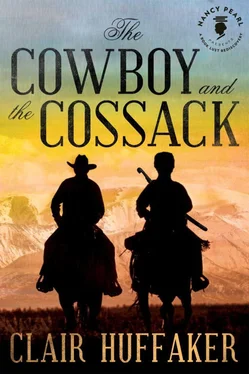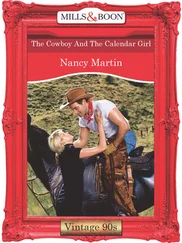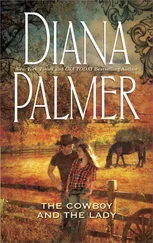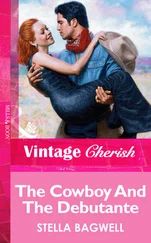The Tartars who had lived through it had stripped the place of everything in the way of weapons or clothes they could use.
The only things that were left were bodies, too many bodies to bury. And it sure hit hard how little use a body really is. Without life and breath and spirit in it, it’s worth no more than the ground it’s lying on. We left them for their flying gravediggers, the vultures.
The one thing they hadn’t touched was what was left of Shad. When we cut him down, I was reminded, like Rufe had been, of Mushy fixing all our boots. He’d done a real good job on Shad’s, and I hated to see those good boots scorched and burned into nearly nothing but blackened ashes.
It was the damnedest thing how nobody had to say one word, in the silence of all that earth and all that sky.
We knew that he should be buried right there, and some of us dug a good, deep grave with straight sides. Then, still silently, we wrapped him gently in a warm blanket and lowered him down.
There was one more small thing that had to be done. So I got down beside him and pulled the blanket a little away from his eyes and his face. He just had to be able to see.
And there was one more thing I didn’t know about, that was even more important, that had yet to be done.
Looking down at Shad, Rostov slowly took out his great saber. He drew the blade’s sharp edge across his arm so that the last blood on it would be his own.
Then he put the saber back in its scabbard, and I thought there would be nothing more.
But there was.
Rostov now unbuckled the belt that held his saber. Then slowly and very gently, he put both the belt and saber down beside Shad.
Then we started slowly to fill the grave, and still not one word had been spoken.
But much had been said.
FROM THE DIARY OF LEVI DOUGHERTY
LOOKING BACK at the way we finally got home to Montana, I guess the most unusual thing about it is that we did it sort of backwards.
We spent a week or so in Bakaskaya, and the two or three thousand men, women and children who made up that small fortress of free cossacks took us in and treated us as their own.
But when it came time to go, they were afraid for us to head back by way of Khabarovsk and Vladivostok. Both Tartars and the Tzar’s men might be laying for us back there. And even if we weren’t killed or thrown in jail, but just delayed, winter was coming on and the port of Vladivostok was often froze up solid for months.
So, all in all, it was agreed that we’d just keep heading more or less west. Thinking about it for the first time, that struck me as a funny kind of a thing. A fella leaves home and he doesn’t necessarily ever have to turn around and retrace his steps to go back. If he goes in one straight line far enough, why there he’ll be one day right smack back home.
If a man anyplace in the world holds up two fingers, then they’re as close together as, say, two fingers. But if you move outward from one finger and keep going that way, then the most faraway thing in the world, finally, is that other finger that’s been right next to it all the time.
A second thing that should have surprised me, but somehow didn’t, was the fact that Old Keats decided not to go with us, but to stay. They’d told us all that Bakaskaya was our home, and they’d meant it. They’d put Keats up in Lieutenant Bruk’s room, and that room was a lot like Bruk himself, open and spacious, yet somehow warm and comfortable at the same time, with a fireplace and a couple of big chairs and one whole wall full of books that Keats was just starting to be able to read.
When Old Keats told Slim and me and the others about his decision to stay, his voice was low and a little gruff. And then he said, “Hell, what’d I do back there anyway, except waste away m’ last years associatin’ with the likes a’ you. Here I c’n spend some time teachin’. An’ I c’n help them look after the herd an’ gradually build it up.” He hesitated. “So don’t argue.”
Finally, just as quietly, Slim said a thing that was already fairly apparent by our silence. “Nobody’s arguin’, Keats.” And then, even more quietly, he added, “But that sure don’t mean that ya’ won’t be sorely missed.”
When it came time to go, and Old Keats and I faced each other alone for the last time, we were both hard put for words.
Finally, choosing from among a thousand hours of things I wanted to tell him, I said, “I like your poem.”
After a moment he said, “Each man is his own poem, Levi. Keep yours a good one.”
And that’s about all we could manage, except for a hard hug, and then I went away.
But in leaving Bakaskaya, there was one argument we flat out lost. Rostov said that he, Igor, Nick and every other cossack who’d been with us before were going to take us safe out of Russia. We were going clear to Odessa, on the Black Sea, and on the map it looked like about a million miles. And also, being outlaws from the Tzar, they would be in real danger.
We tried to stop them from coming with us, but we had about as much chance as the night stopping the sun from coming up.
Being free, well-mounted horsemen, with spare mounts and nothing to hold us up, we made good, fast time every day and every week and finally every month. But that was one long haul. Somebody later figured out that from Bakaskaya to Odessa was one hell of a lot further than a trip clear across the whole United States.
Early in the trip, about two weeks out, we passed the biggest lake I’d ever seen, called Baykal. It could have been an ocean as far as I was concerned. And camping along the shore, Rostov told us a staggering thing about it. “They’ve estimated,” he said, “that with its size and depth, when a drop of water enters Lake Baykal at the north, it takes four hundred years before it comes out at the south.”
“Christ,” Crab muttered, “I never even thought of a drop a’ water lastin’ that long.”
But still, somehow, that one drop of water surely was something to think on.
A couple of months later, the Siberian winter started to thunder down out of the north like a white, cold enemy as big as the whole sky. But by then we were starting to move south and west out of the toughest winter weather. Farther up north and east, Rostov told us, it often hit seventy below, and the sap freezing inside a tree would sometimes break that tree in half with a cracking roar like a cannon going off.
The weather was bad enough where we were though, and if your forehead started to sweat a little from hard riding, it wouldn’t be long before you had icicles on your eyebrows. One time when I was complaining about that very thing, and rubbing ice from around my eyes, Igor shrugged and said, “There is a saying, Levi, that one Siberian summer is worth ten Siberian winters.”
And miserably cold as I was just then, thinking of all the beautiful land and weather we’d gone through with the herd, whoever made up that saying had a point.
Finally we crossed the southern tip of the Ural Mountain range, which is really nothing much more than foothills that somehow got called mountains, and we headed more southerly than before.
In the next little while the weather changed a whole lot for the better, and within two or three weeks we came into sight of the Black Sea. I don’t know who named it, because it wasn’t black or even dark at all, but was as blue as some kind of a sky that God had accidentally made out of water.
Our Sea Papers were still in order, and we got aboard a boat at Odessa. We had to change boats four or five times to get to Philadelphia finally, going through strange-sounding seas like the Marmara and Aegean, and then the Mediterranean, which took us out beyond the Rock of Gibraltar and into the Atlantic. From Philadelphia, we took a train, and that was the end of the trip.
Читать дальше












